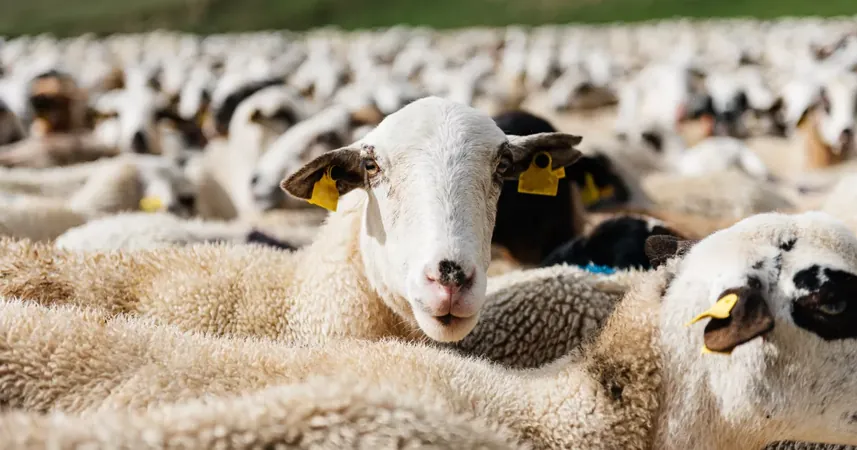
Breakthrough in Veterinary Medicine: Two Powerful Bluetongue Vaccines Set for EU Approval!
2025-01-17
Author: Li
Introduction
In an exciting development for livestock health, the European Medicines Agency (EMA) has recommended the approval of two innovative vaccines, Bluevac-3 and Syvazul BTV 3, designed to combat the devastating bluetongue disease that primarily affects sheep. Notably, Bluevac-3 is also cleared for use in cattle, marking a significant advancement in veterinary medicine.
The Need for New Vaccines
Bluetongue disease is caused by the bluetongue virus (BTV), which exists in various serotypes. Recent outbreaks in Europe have been linked to the newly identified serotype-3 virus (BTV3). Current vaccines authorized for use across the EU offer limited protection against this particular strain, highlighting the critical need for these new vaccines that have been fast-tracked for approval under exceptional circumstances.
Impact of Bluetongue Disease
The disease poses a severe threat to both wild and domestic ruminants, including sheep, goats, and cattle. Transmission occurs primarily through bites from infected Culicoides flies, allowing the disease to spread rapidly among herds. The severity of bluetongue varies by species, and it can lead to significant mortality in sheep, making effective vaccination crucial.
Public Health Considerations
Importantly, there is no risk to public health—humans cannot contract bluetongue from animals, either through direct contact or via meat and milk consumption. Nonetheless, these vaccines play a vital role in controlling disease outbreaks, minimizing economic losses, safeguarding livestock trade, and alleviating animal suffering.
Vaccine Composition and Mechanism
Both vaccine candidates utilize an inactivated form of BTV3, which means they cannot cause the disease but can stimulate a robust immune response in vaccinated animals. These vaccines are designed as ready-to-use suspensions for injection and include adjuvants to enhance immunity.
Clinical Efficacy
The efficacy of Bluevac-3 was rigorously evaluated in two separate studies involving vaccinated lambs and calves. Results indicated that after receiving two doses of the vaccine, spaced 21 days apart, both species exhibited a significant decrease in viral load within their bloodstream, alongside reduced severity of symptoms and mortality rates in lambs. Similarly, assessments of Syvazul BTV 3 in vaccinated sheep revealed a decline in viral presence, symptom severity, and overall mortality.
Risk Assessment
Crucially, the comprehensive risk assessment conducted as part of the vaccine evaluations indicates that neither vaccine is expected to pose any health risks to humans, animals, or the environment when administered as per the product guidelines.
Next Steps
The Committee for Medicinal Products for Veterinary Use (CVMP) has now forwarded its opinion to the European Commission, paving the way for the official EU-wide marketing authorization of both Bluevac-3 and Syvazul BTV 3. With their anticipated approval, these vaccines represent a beacon of hope for farmers and the livestock industry, ensuring healthier animals and maintaining the stability of livestock production across Europe.
Conclusion
Stay tuned for updates on the final approval and find out how these vaccines could transform the landscape of animal health and welfare!



 Brasil (PT)
Brasil (PT)
 Canada (EN)
Canada (EN)
 Chile (ES)
Chile (ES)
 Česko (CS)
Česko (CS)
 대한민국 (KO)
대한민국 (KO)
 España (ES)
España (ES)
 France (FR)
France (FR)
 Hong Kong (EN)
Hong Kong (EN)
 Italia (IT)
Italia (IT)
 日本 (JA)
日本 (JA)
 Magyarország (HU)
Magyarország (HU)
 Norge (NO)
Norge (NO)
 Polska (PL)
Polska (PL)
 Schweiz (DE)
Schweiz (DE)
 Singapore (EN)
Singapore (EN)
 Sverige (SV)
Sverige (SV)
 Suomi (FI)
Suomi (FI)
 Türkiye (TR)
Türkiye (TR)
 الإمارات العربية المتحدة (AR)
الإمارات العربية المتحدة (AR)